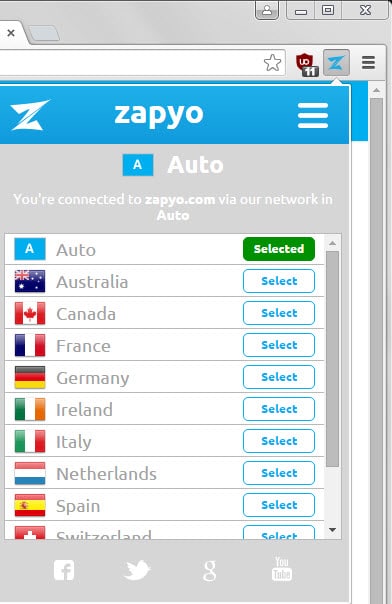Why it pays to read the privacy policy before you sign up for a service

I browse the Firefox add-on store regularly to find out what is new and updated. Discovered the add-on Zapyo in the store which promises "Internet without restrictions".
It is not only available for Firefox but for all major browsers including Chrome and Internet Explorer.
The service is not offering VPN-like functionality but acts as a proxy for users so that blocked or restricted contents can be accessed (so that traffic flows through their servers).
For instance, if you cannot access streaming media in the US because you are abroad, you may use it to bypass that restriction.
Since it is a proxy service, it has little overhead and does not require a massive server infrastructure to serve all users and ensure that content is delivered without slow downs or other issues.
Zapyo recognizes popular sites automatically when in auto-mode, but offers a manual mode as well to get websites to work that it does not recognize.
Please note that you need to sign up using email before you can make use of the service.
What the privacy policy tells you
If you check out the website before you sign up, you find information about the service that the main content pages don't reveal.
- The Terms and Conditions highlight that the website and its service is run by Worldwide Advertising Limited, a company incorporated in the Seychelles.
- The Privacy Policy highlights data that the company collects and what it uses the data for.
This includes email and IP address, but also "anonymous data related to your online behavior" which includes the websites you visit and how often you do so, the browser, user agent, operating system and device you use to do that.
According to the Privacy Policy, it is being used "in retargeting campaigns and serving of online relevant ads". Retargeting works by keeping track of online users across websites to deliver offers to them that they have viewed previously. For instance, if they have visited an online store and looked at Adidas sneakers but did not purchase any, retargeting will display Adidas sneaker ads on other websites that have implemented the ad code.
The website itself connects to a large number of advertising servers, likely for use in retargeting campaigns.
The service itself does not seem to display ads on its own site or embed advertisement on third-party sites currently.
Closing Words
Free is not always free on the Internet, and there is usually a cost involved (albeit not necessarily monetary) when you sign up for free services.
In the case of Zapyo, it is your data -- anonymized -- that gets collected and processed. It is not the only service that handles things this way. In fact, most "bypass services" do the very same thing or worse, as the recent Hola incident has shown.
Now You: do you read the privacy policy and terms before you sign up?






















“The service is not offering VPN-like functionality but acts as a proxy for users so that blocked or restricted contents can be accessed (so that traffic flows through their servers).”
…Isn’t that what a VPN does?
Martin,
Thanks for your newsletter.
Advertising is everything!
Since your request not to block, I watch the number of trackers that Ghostery picks up as I read your articles.
Reading this page It has gradually built up and just reached FIFTY as I type this!
Free stuff means they are sellibg your data. that’s why i read privacy policy of each free service that i use. i
This is why I always read the privacy policy of browser addons/software/android apps. And I refuse to install if one them want to mine my data. Yes, I know it frustating to read whole damn wall of text but if you care about your privacy then you need to bear that pain. :)
This seems like a good place to remind readers of the TOSDR service: Terms of Service, didn’t read!
TOSDR is a web-service which grades other services on how much they screw you over. The database is created by real people and you can help by submitting info to an actual person who can update the database with that info. You can access the service by their browser add-on, and it works in the good way for the grades (local db copy) not the bad way (online lookups that reveal the domain you’re on). It’s pretty good but it hasn’t really taken off. They really need to form an alliance with other privacy groups imo.
Easily localized with DuckDuckGo Web search engine :)
Thanks for the info, Dave.
Worrying – but after all, nothing more than MS, Google and most Android devices have been doing for years anyway.
Most of my friends are pretty much IT-dyslexic – to the extent they regard me as an expert when I’m nothing of the sort. But at least I’m careful – while they actually don’t CARE about security as long as stuff like Facebook and Twitter are ‘free.’ Judging by the crap running in the background 24/7 on their devices, I shudder to think what data is mined on a constant basis. Purely to ‘enhance the quality of the services’ of course.
Happily, we can choose not to use Zapyo. Pity about all rubbish that’s pre-installed these days.
Very true, in fact MS, Google and most Android devices take things to a whole new level of data mining.
Microsoft’s privacy statement has me wondering why anyone would use anything with Windows 8,8.1, or the upcoming Windows 10 on it, they’re so invasive that people should just be asked if they are happy having everything they do on their new PC monitored and recorded.
https://tosdr.org/ -> This might help to summarize those TOS.
OK, I started reading last positioned comment, Dave’s. Looks interesting. Thanks.
You are absolutely right Martin. But I think if you go into a service like this with eyes open, then its not as big a deal.
Companies like this prey on people’s desire for everything to be free but you must remember that nothing truly can be free. Its not unlike politicians making the same promises every election to the same special interest group but never delivering. People are greedy for what they think is due them.
However companies need an income stream to pay those developers, pipes & bandwidth. They cost money. There is nothing wrong with charging for a product or service. In fact, this service should’t be a big deal IF YOU UNDERSTAND WHAT IS HAPPENING. What they are doing isn’t any different from Google’s “free” services or Google’s fiber network they are building out in metro areas here in the USA. To make a point, why would Google give away free internet via fiber if they didn’t get something out of it? They wouldn’t, it would be pretty dumb on their part.
We as internet consumers need to be aware of whats happening to our experience when we use the internet and services through it. We probably should only get really upset when companies mask their intention and then fight for fair terms & conditions. Thats my 2 cents.
The problem is not that of transactions, these exist since mankind. It’s on our very nature to exchange.
The problem is in the deal’s fairness. Also, in the “opportunity cost” as a corollary. The cost of one’s privacy (that involved in the exchange) and the income of a service.
One thing for sure companies should stop deploying the “free” slogan when in fact there is a cost even if the price is free.
Not sure many people know what’s in the deal, not sure either among those who do know how many consider their privacy so cheaply that it’s worth a “free” service. I do take into consideration psychology far more than sociology, but remains the fact that, in the face of avidity, we are many — but not all — to forget ideals and self-respect when it comes to grabbing what we aim, or having let ourselves be conditioned to believe such was an aim, mine, ours included.
Of course everything — almost — has a price. I mean, I remember in the sixties back in NY parents paying their kids to mow around the house! (not ready for that here in France!). I mean, a helping hand does not always have a cost, hidden or not.
To evoke big companies, destinies, I don’t believe fortune was the aim, and that’s how real fortune arises : there’s a passion and money follows, and money nourishes the go and the go further, higher, but it’s basically the passion which launches those destinies. That’s also why when a company forgot the passion to narrow on the income it may very well start to sink.
So : long live deals, but honest ones, or at least closer to ethics than it too often is. I’d love to hear a company state : “What we offer is this, and the price is free but the cost will be this and that of your privacy” : at least a clear offer.
I just discovered a new advertizement process : retargeting! Where will they stop?!
Zapyo run by Worldwide Advertising Limited… oh, brother!
Do I read the privacy policy and terms before I sign up, Web service as elsewhere? I haven’t for many years, I do so more and more, especially when the service seems particularly attractive. I believe, I’m even certain that reading the TOS is becoming an automated behavior when registering to a Web service.
Thanks for the info on Zapyo and the incentive to not forget, never, to read — and take into consideration — a service’s privacy policy. I do insist on taking into consideration because human nature is so odd that sometimes it satisfies itself with the right to condemn, to refuse, forgetting its ability to condemn and refuse, that is : to avoid.
I am currently using IronSocket and it works great. Beautiful, easy to use, clever interactions, customer service is excellent. An excellent, inexpensive, and well-polished product all around. Access restricted content in every region of the world is not an issue now a days. You can use VPN service, which is secure and safe solution for Internet Freedom.If you want the best personal VPN service, then IronSocket is for you. Cheers.